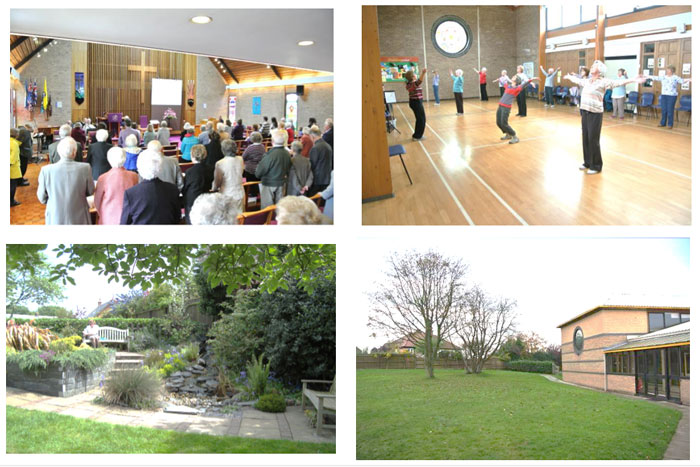Heswall URC is situated in the centre of a lively town which has a population of approximately 13,400 but serves a much larger catchment area with a population of over 30,000.
Heswall URC continues to be one of the largest churches in the Mersey Synod with families with young children. We are part of a joint ministry with St. Georges URC, Thornton Hough. Heswall is a relatively modern church with excellent facilities whilst St Georges is an idyllic Norman style church set in a picturesque rural village setting which is extremely popular for weddings.
Heswall is a thriving church blessed with committed members and a strong Eldership team. In setting its priorities there is a focus on nurturing faith and strengthening its witness by proclaiming the good news of the kingdom of God with Friends, families and strangers through story and action. There is also an emphasis on being active in the life of the local community by serving and caring for others. Our form and style of worship continues to attract and retain young families within our fellowship and encourage attendance of all ages. We are fortunate to have a Children’s and Families Worker who has developed a wide range of support initiatives.
We have recently appointed a replacement Youth Worker to further the mission to support the youth particularly the highly successful Friday Youth Club and the re-establishment of a contemporary Sunday evening service with a youth theme.
Heswall is located in a much sought after location situated on the western side of the Wirral peninsula with panoramic views over the Dee Estuary to the North Wales coastline. Heswall is surrounded by the villages of Irby, Pensby, Barnston, Thurstaston and Thingwall, whose names recall their Nordic origins; each retaining its own individuality whilst absorbing the pressures of newer residential growth.
The borough of Wirral is one of contrast and diversity, both in physical characteristics and in social demographics. There are rural, urban and industrialised areas, in addition to parks, countryside and over 20 miles of coastline. There is a significant social contrast between West Wirral, where Heswall lies, and East Wirral (Wallasey and Birkenhead). There is a mixture throughout, but in the main the towns on the west side are relatively prosperous and comfortable places to live, while those to the east have much greater social problems.
Heswall is a popular as a commuter town for people who work in Birkenhead, Liverpool and Chester and for people retiring. In addition to a significant number of privately owned shops, there is a large supermarket, a library, function hall and a fire station. There is a developing café culture and numerous restaurants for which many people from outside the area come to visit Heswall to dine or shop.
The population of Heswall is largely of white British heritage and is fairly static. Overall, West Wirral has a population composed mainly of families and older people with a relatively low proportion of adults in their twenties. This is reflected in the make-up of Heswall and of the Church. Heswall has a mixture of people, including some who face economic difficulties, but it is broadly regarded as an advantaged socio-economic area, perhaps best described as middle-class. However, regard has to be taken for the substantial and rising 70+ population of the area, many of whom are widowed living on their own and finding it difficult to cope on their pensions.
In addition to the schools in Heswall, on the Wirral there is a wide range of schooling from pre-school age through to non-selective secondary schools (both High and Academies) and a number of grammar schools for both boys and girls.
The Church is broadly traditional, but flexible to and open to explore new ways worship. Over the years the church has attracted some from other denominations. At the core the vast majority of the congregation believe the Bible to be the Word of God and want their faith to be built upon a sound foundation of Bible-based teaching.
The church buildings are relatively modern with excellent facilities which have recently benefitted from a refurbished heating system, roof, and kitchen. The frontage to the Church has been modified to enhance the entrance to the Church and sanctuary, whilst also improving access arrangements and facilities. The church has a private car park and grounds which include a tranquil ‘Quiet Garden’ for Church and Community use. The premises have good wheel chair access and disabled facilities.
Worship services are held each Sunday at 10.30 am in a relatively traditional format using a variety of established hymns and modern songs (mainly from Rejoice & Sing, Mission Praise and more contemporary sources). Holy Communion is celebrated monthly. Music is led by a combination of a music group and the organ in the morning service.
The six churches in Heswall all work together in various ways and to varying degrees. Heswall URC actively embraces this ecumenism, which is expressed through shared acts of worship and witness and a history of a combined programme of activities during Lent.
Key dates in the life of Heswall URC
- April 1895 – Sale of work in West Kirby Presbyterian Church to provide funds for local mission work. Services start in Plum Tree Cottage.
- 1896 – Worship begins in the “Tin Tabernacle”
- June 1908 – Church Hall opened.
- April 1909 – First service in the brick built church.
- December 1970 – New Church dedicated.
- 5th October 1972 – United Reformed Church comes into being.
- September 1992 – New Hall dedicated.
- 23 – 30 April 1995 – Church Centenary Celebrations. Church refurbished and plastic chairs replaced with upholstered chairs.
- September 2001 – Introduction of screen and multimedia projector for use in worship.
- June 2003 – Pews replaced with upholstered chairs.
- Easter 2006 – Church Quiet Garden dedicated.
- 2012 – Heswall URC elected to be a place of worship where Civil Partnerships could be registered.

